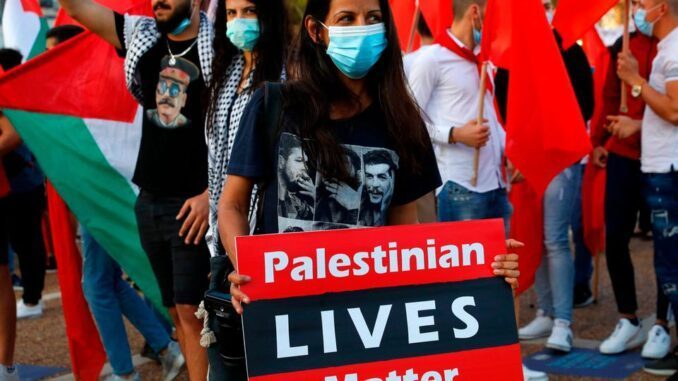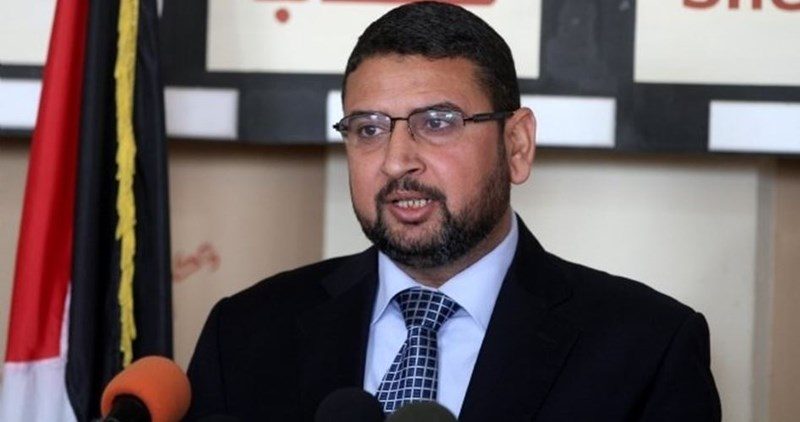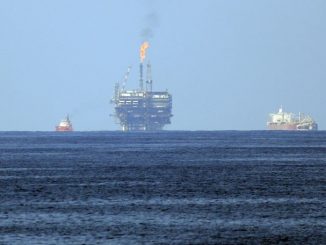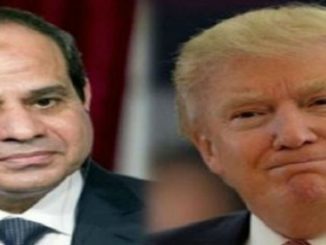
Hundreds of Jewish settlers in the occupied West Bank gathered on a hilltop to voice rejection of Israel’s annexation plan
About 1,000 Jewish settlers took to a hilltop on the outskirts of the illegal Gush Etzion settlements in the occupied West Bank to voice their rejection of Israel’s annexation plan in line with US President Donald Trump’s ‘peace plan’.
The rally was held in cooperation with the Nachala Settlement Movement.
“We are against the establishing a Palestinian state,” director of the movement Daniela Weiss told Arutz Sheva.
Demonstrators claimed the map issued by Trump’s ‘deal of the century‘ leaves Palestinians with 70 per cent of the occupied West Bank, vowing to build more settlements in occupied Palestinian territory.
Israeli Prime Minister Benjamin Netanyahu has set 1 July as the day to start annexing the occupied West Bank and Jordan Valley.
Palestinians believe the plan will see the occupation state illegally seizing 30 per cent of the West Bank. They have said they are no longer bound by treaties agreed with Israel if annexation goes ahead.
Palestinians ask ICC to investigate Trump and Netanyahu over annexation
In the same context, four Palestinian residents of the West Bank told International Criminal Court they have been affected by US ‘deal of the century’
This group of Palestinians from the occupied West Bank submitted a complaint on Tuesday to the International Criminal Court (ICC), requesting an investigation into senior Israeli and US officials who authorised Donald Trump’s “Peace to Prosperity” plan.
William Schabas, a professor of international law at the UK’s Middlesex University, filed the complaint on behalf of his clients citing Israel’s plans to unilaterally and illegally annex up to a third of the West Bank, a scheme that gained traction after Trump’s plan was launched in January.
Schabas asked the ICC’s prosecutor to probe the acts of Trump, Israeli Prime Minister Benjamin Netanyahu, US Secretary of State Mike Pompeo and Jared Kushner, Trump’s son-in-law and architect of the scheme commonly known as the “deal of the century”.
In a statement, Schabas said “there is credible evidence” that Trump, Pompeo and Kushner “are complicit in acts that may amount to war crimes relating to the transfer of populations into occupied territory and the annexation of the sovereign territory of the State of Palestine”.
The four Palestinian residents of the West Bank Schabas represents, Ahmad al-Khaldi, Gassan Khaled, Hasan M Masan and Abderrahman F Zaidan, are directly affected by Trump’s plan, he said.
Under the Peace to Prosperity scheme, a disjointed “independent” Palestinian rump state would be established in the West Bank and Gaza Strip through land swaps and Israeli annexation. It would leave the Palestinian territories an archipelago of areas joined up through a series of tunnels and bridges, without control of its own borders.
However, elements of the Israeli government seem keen to press ahead with annexation with or without US coordination, and its plans could be revealed as early as Wednesday. Washington may still give its public blessing to such a move, despite it being taken without moves towards establishing a Palestinian state as outlined in the Peace to Prosperity plan.
“The threatened annexation of parts of the West Bank by Israel is an international crime defined in the Rome Statute of the International Criminal Court. It is intricately linked to the war crime of changing the population of an occupied territory,” Schabas said.
Efforts to investigate Israel in the ICC previously have been acrimonious.
Late last year, ICC prosecutor Fatou Bensouda announced a full-scale investigation into Israeli violations against Palestinians in the West Bank and Gaza.
“I am satisfied that there is a reasonable basis to proceed with an investigation into the situation in Palestine,” Bensouda said in a statement in December.
“In brief, I am satisfied that war crimes have been or are being committed in the West Bank, including East Jerusalem, and the Gaza Strip.”
The decision was fiercely rejected by Israel and the US, and earlier this month Trump announced he was placing sanctions on ICC officials investigating abuses by Americans and Israelis, claiming that the Hague-based tribunal has no “jurisdiction over personnel of the United States and certain of its allies”.
Though Israel is not a signatory of the ICC’s Rome Statute, the Palestinian Authority is.
Netanyahu hints at delay to annexation plan
Meanwhile, Israeli prime minister suggested that deadline may be missed, after Benny Gantz said Covid-19 was more urgent than annexation.
The Israeli PM is facing opposition from Palestinians, the international community and even his own government.
Netanyahu had pledged to begin the process of annexing Israeli settlements and the Jordan Valley from 1 July, as part of a peace plan devised by Donald Trump’s US administration. But he hinted at a delay on Tuesday, saying annexation talks would continue “in the coming days” with US officials.
The remarks came a day after the alternate prime minister, Benny Gantz, said annexation must wait while the country tackles the coronavirus pandemic, pointing to deep divisions arising from Washington’s initiative.
Unveiled in January, the Trump administration’s plan supported annexation, but also foresaw the eventual creation of a Palestinian state – a red flag for many Israeli settlers, who believe their government should control the entire West Bank. A map published with the US plan shows a fragmented Palestinian state, pockmarked by Israeli settlements that are joined by Israeli access roads.
Washington’s proposal was rejected by the Palestinian leadership immediately, as it offers them a rump state while rejecting their fundamental demands, such as a capital in East Jerusalem.
Despite Palestinians’ firm rejection of the US plan, anti-annexation protests in the West Bank have failed to draw large crowds. The largest rally drew a few thousand people, including foreign diplomats, to Jericho in the Jordan Valley in June. Under Washington’s plan, the city would remain Palestinian while the surrounding area including the border with Jordan would be annexed by Israel.
The Palestinian prime minister, Mohammad Shtayyeh, said a counter-proposal to Washington’s plan had been submitted to the UN, the US, the European Union and Russia, which make up the Quartet.
While Shtayyeh did not detail the proposal, the Palestinian Authority said it was prepared to resume negotiations with Israel, according to a letter seen by AFP news agency.
There has been no public response to the Palestinian proposal and the international community has pressed Israel to halt annexation, deemed illegal by the UN.
“I am deeply concerned that even the most minimalist form of annexation would lead to increased violence and loss of life,” the UN’s top human rights official, Michelle Bachelet, said on Monday.
Jordan, which along with Egypt is the only Arab country to have a peace accord with Israel, has threatened to downgrade or scrap the 1994 agreement.
The EU is weighing up retaliatory measures, and Netanyahu’s government has lobbied the foreign ministers of Germany, Greece and Cyprus to tone down the bloc’s response during their recent visits to Israel.
In the face of opposition from abroad and at home, Netanyahu may amend his plans and annex settlement blocks close to Jerusalem only.
The US team, which includes the White House envoy Avi Berkowitz, is reportedly seeking an agreement between Netanyahu and Gantz before giving its backing to annexation in any form



